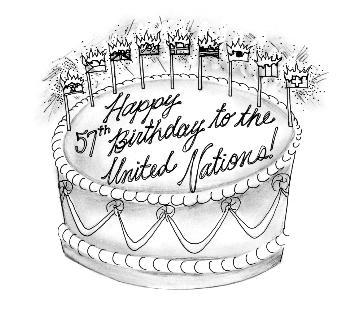
News
Harvard Medical School Cancels Student Groups’ Pro-Palestine Vigil

News
Former FTC Chair Lina Khan Urges Democrats to Rethink Federal Agency Function at IOP Forum

News
Cyanobacteria Advisory Expected To Lift Before Head of the Charles Regatta

News
After QuOffice’s Closure, Its Staff Are No Longer Confidential Resources for Students Reporting Sexual Misconduct

News
Harvard Still On Track To Reach Fossil Fuel-Neutral Status by 2026, Sustainability Report Finds
A Birthday Wish for the United Nations
Editorial Notebook

Yesterday, the United Nations celebrated its 57th year of existence, neatly bearing the label U.N. Day. Ostensibly, yesterday was the day where all those helped by the U.N.’s worldwide presence and multi-billion dollar budget stood up, danced in the streets, shouted, “Thank you, Kofi Annan!” and showed their overall gratitude to the international organization. There are good reasons why the cheers were not too loud.
It is no secret that the U.N. has long been riddled with an overpowering impotence that prevents it from taking a meaningful role in many humanitarian efforts. The U.N. has rarely committed itself to large efforts and has failed to stop major human rights atrocities in the five decades following World War II—including the killing fields of Cambodia and Idi Amin’s terror in Uganda to name only a few. Vague Security Council mandates cause U.N. action to be confined to arbitrary rules and confounded goals. In its 1993 intervention in Somalia, for instance, the U.N. dedicated itself to feeding a nation under the grasp of warlords and then refused to engage those same warlords militarily when the food shipments were violently seized. In 1995, when Serb militants attacked Srebrenica, a safe zone for refugees, U.N. blue helmets did not engage militarily to protect the refugees. Instead, the U.N. mission’s lack of communications and an unclear mandate allowed the Serbs to carry out the largest civilian massacre in Europe since World War II. For the U.N., the general rule seems to be inaction in preventing and ending human rights atrocities. Inaction marks the U.N. even when its own economic and social humanitarian projects become unenforceable as a result of local tyrants.
Many such conflicts that the U.N. ignored or botched were settled by internal or multilateral action, largely without U.N. assistance. The Khmer Rouge was destroyed by a Vietnamese invasion; the U.N. dared to step in only after 28 years of oppression. Idi Amin’s rule, during which as many as 300,000 people died, ended when the Tanzanian military invaded on humanitarian and political motives. In the former Yugoslavia, the U.S.-sponsored Dayton Accords—unaffiliated with the U.N.—ended the conflict. The world has a lot more reason to thank the United States and even Tanzania and Vietnam for their successful humanitarian actions, regardless of their political motives.
Additionally, the U.N. has political motives in deciding when and where to intervene. Unlike the unambiguous political motives of single nations, the U.N.’s motivations are conglomerations of all states involved in the missions. It is unclear, for instance, if a U.N., Arab-dominated humanitarian aid mission to the Occupied Territories of the Middle East is really aimed at clothing, educating and feeding refugees or if it is there to promulgate anti-Israeli propaganda. Because of these mixed motives, more U.N.-based humanitarian aid projects exist in places like the Occupied Territories and other geopolitical hotspots while those less controversial, like much of Africa and Asia, are left to Doctors Without Border, the International Red Cross and other humanitarian NGOs. Even within peacekeeping missions, political motivations dominate. The Balkans region received thousands of peacekeepers during its conflict due to Western nations’ domination of the Security Council. Conversely, the Security Council was unable to fully support a weak peace-keeping operation in Rwanda in April 1994, when the first reports of genocide reached U.N. ears. Ultimately, the U.N.’s lack of interest in Rwanda led the Security Council to ignore the problem until 800,000 people were killed in just over 100 days.
Those U.N. programs that do help people—like UNICEF, the U.N. Refugee Agency and the World Food Program— deserve praise. Nevertheless, the frequent failures to act appropriately in humanitarian crises are important reminders that the U.N. should not be blindly praised. Yesterday, the U.N. had much more to be ashamed of than to be lauded for on its own self-promoting holiday.
—TRAVIS R. KAVULLA
Want to keep up with breaking news? Subscribe to our email newsletter.
